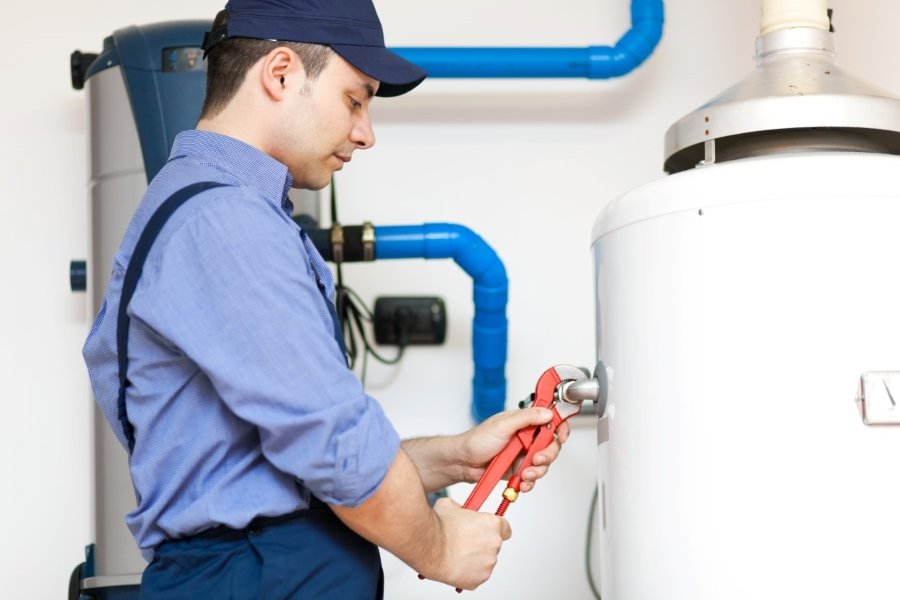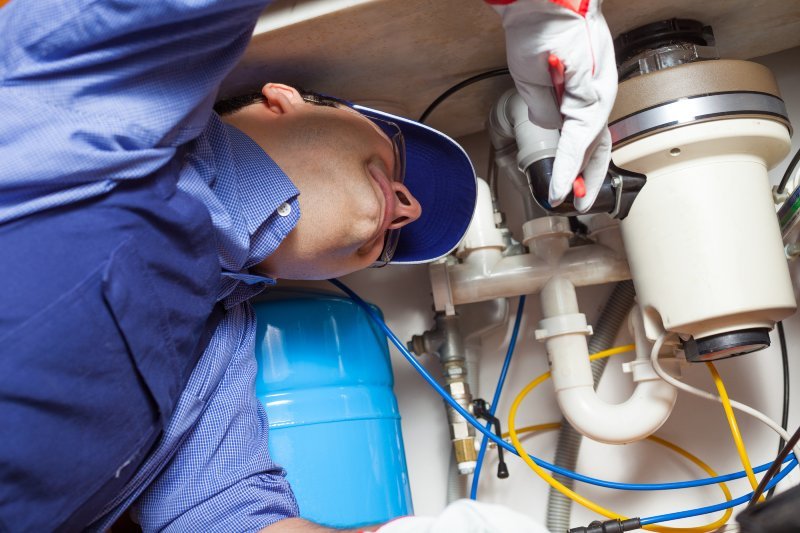Water Heater Repair – Austin,TX
CALL FOR AN ESTIMATE
What is the most common cause of water heater failure?
One of the most common causes of water heater failure is sediment buildup inside the tank. Over time, minerals and debris in the water can settle at the bottom of the tank, forming a layer of sediment. This sediment can insulate the heating element from the water, causing it to overheat and potentially fail. Additionally, sediment buildup can lead to corrosion and rusting of the tank, which can eventually result in leaks or other issues.
Regular maintenance, such as flushing the tank to remove sediment, can help prevent water heater failure due to sediment buildup. Other common causes of water heater failure include:
1. Corrosion: Corrosion of the tank or components can occur over time, especially in areas with hard water or high mineral content. Corrosion can weaken the tank and lead to leaks or other failures.
2. Faulty heating element: Electric water heaters rely on heating elements to heat the water. If the heating element fails, the water heater may not produce hot water or may produce insufficient hot water.
3. Pressure buildup: Excessive pressure inside the tank can cause the pressure relief valve to open, releasing water and relieving pressure. If the pressure relief valve fails to function properly, it can lead to leaks or other issues.
4. Gas supply issues: Gas water heaters require a steady supply of gas to function properly. Issues with the gas supply, such as a gas leak or a faulty gas valve, can cause the water heater to malfunction or fail.
5. Age: Like any appliance, water heaters have a limited lifespan. As water heaters age, they become more prone to failure due to wear and tear on components and deterioration of the tank.
Regular maintenance, timely repairs, and periodic inspections by a professional plumber can help identify and address potential issues before they lead to water heater failure. It’s also essential to consider the age and condition of your water heater when deciding whether to change water heater or replacement water heater.



Plumber Near Me….
Request A Quote
We promise to get back to you as soon as possible.
What plumbing services do you offer?
DRAIN CLEANING SERVICES
WATER HEATER REPAIR /REPLACEMENT
TOILET REPLACEMENT
PLUMBING SERVICES
KITCHEN SINK REPLACEMENT
GARBAGE DISPOSAL REPAIR
RESIDENTIAL PLUMBING SERVICES
COMMERCIAL PLUMBING SERVICES
GARBAGE DISPOSAL REPLACEMENT
Schedule An Estimate
CALL NOW (512) 894-6169
Why a hot water heater is not working?
A hot water heater may not be working for several reasons. Here are some common causes to consider:
1. Power or fuel supply: For electric water heaters, check if the circuit breaker or fuse for the water heater has tripped or blown. For gas water heaters, ensure that the gas supply valve is open and that the pilot light or igniter is functioning properly.
2. Thermostat issues: The thermostat controls the temperature of the water heater. If the thermostat is set too low or is malfunctioning, the water heater may not produce enough hot water. Check the thermostat settings and consider adjusting them or replacing the thermostat if necessary.
3. Heating element (for electric water heaters): Electric water heaters have one or more heating elements that heat the water. If a heating element fails, the water heater may not produce hot water or may produce insufficient hot water. Inspect the heating elements for signs of damage or wear, and replace them if necessary.
4. Gas valve or burner (for gas water heaters): Gas water heaters rely on a gas valve and burner assembly to heat the water. If the gas valve is closed, the burner is clogged or damaged, or there is a problem with the gas supply, the water heater may not produce hot water. Check the gas valve, burner assembly, and gas supply to ensure they are functioning properly.If you find yourself in an emergency situation, it’s essential that you contact an emergency plumber near me immediately.
5. Sediment buildup: Sediment can accumulate at the bottom of the water heater tank over time, insulating the heating element from the water and reducing its efficiency. Flushing the tank to remove sediment buildup can help restore hot water production.
6. Pressure relief valve: The pressure relief valve is designed to release excess pressure from the water heater tank. If the pressure relief valve is stuck open or closed, it can affect the performance of the water heater. Check the pressure relief valve and replace it if necessary.
7. Tank size: If the demand for hot water exceeds the capacity of the water heater tank, it may run out of hot water quickly or struggle to keep up with demand. Consider upgrading to a larger capacity water heater if necessary.
If you’re unable to determine the cause of the issue or if the problem persists after troubleshooting, it’s recommended to consult with a professional plumbing emergencies for further diagnosis and repair.
Why do water heaters cost so much to install?
1. Labor costs: The installation process typically involves skilled labor, which contributes to a significant portion of the total cost. Plumbers or HVAC technicians are usually hired to install water heaters, and their rates can vary based on factors such as location, experience, and the complexity of the installation.
2. Materials and equipment: In addition to labor, the cost of materials and equipment required for installation also adds to the overall expense. This includes items such as piping, fittings, valves, connectors, insulation, and potentially additional components depending on the type of water heater being installed.
3. Permit and inspection fees: Many local jurisdictions require permits for water heater installation, and inspections may also be necessary to ensure compliance with building codes and regulations. Permit and inspection fees can add to the overall cost of installation.
4. Removal and disposal of old unit: If replacing an existing water heater, there may be costs associated with removing the old unit and disposing of it properly. This can include labor costs for disconnecting and removing the old unit, as well as any disposal fees.
5. Additional work or modifications: Depending on the specific installation requirements, additional work or modifications to the plumbing, electrical, or gas systems may be necessary. This could include upgrading existing connections, rerouting pipes, or making adjustments to accommodate the new water heater, all of which can add to the installation cost.
6. Type of water heater: The type of water heater being installed can also impact the installation cost. For example, tankless water heaters typically require more complex installation procedures than conventional tank water heaters, which can result in higher labor and material costs.
Overall, the installation cost of a water heater reflects the combination of labor, materials, permits, and other factors involved in the installation process. While it may seem expensive upfront, professional installation ensures that the water heater is installed correctly and safely, helping to avoid potential issues and ensuring optimal performance and longevity.
Is a 30 year old water heater safe?
1. Leaking: As water heaters age, the tank can weaken and develop cracks or leaks. A leaking water heater can cause water damage to your home and potentially lead to mold growth or structural issues.
2. Corrosion: Corrosion inside the tank can weaken the structure of the water heater and increase the risk of leaks or tank failure. Corrosion can also affect the quality of the hot water, leading to rust-colored water or metallic tastes and odors.
3. Carbon monoxide leaks (gas water heaters): Gas water heaters produce carbon monoxide as a byproduct of combustion. If the flue or venting system becomes blocked or damaged, carbon monoxide can accumulate in your home, posing a serious health hazard. Older gas water heaters may be more prone to these issues if not properly maintained.
4. Explosion risk: In extreme cases, old water heaters may be at risk of exploding due to pressure buildup inside the tank. This is more likely to occur if the pressure relief valve is malfunctioning or if the tank has significant sediment buildup.
5. Energy efficiency: Older water heaters are typically less energy-efficient than newer models, which can result in higher energy bills and wasted energy. Replacing an old water heater with a more efficient model can save you money in the long run while also improving safety and reliability.
Given these safety concerns, it’s generally recommended to replace a water heater that is 30 years old or older, even if it appears to be functioning adequately. A professional plumber can inspect the water heater and provide guidance on whether replacement is necessary based on its condition and safety considerations.
About the City of Austin, TX
Apple Plumber and Water Heater Repair
5000 W Slaughter Ln, Austin, TX 78749
(737) 977-9963
Hours of Operation
Mon Open 24 hours
Tue Open 24 hours
Wed Open 24 hours
Thu Open 24 hours
Fri Open 24 hours
Sat Open 24 hours
Sun Open 24 hours
